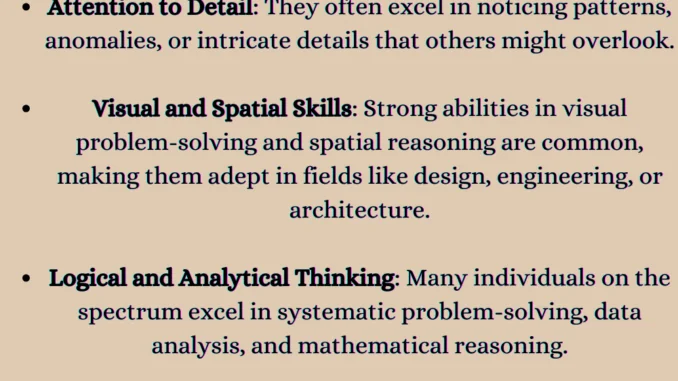
Understanding High-Functioning Autism: Signs and Intelligence
Intelligent Autism refers to a category within the autism spectrum where individuals can manage daily tasks with limited assistance.
Autism Spectrum Disorder (ASD) is a complex neurodevelopmental condition characterized by challenges in social interaction, communication, and repetitive behaviors.
While often associated with developmental delays, it’s essential to recognize that individuals with autism can exhibit exceptional intelligence and unique cognitive abilities.
While autism is a diverse spectrum, here are some common signs associated with high-functioning autism, which may indicate intelligence or unique abilities:
- Social Challenges: Autistic individuals often struggle with social interactions and communication.
- Strong Memory: Some autistic adults exhibit remarkable memory skills.
- Outside-the-Box Thinking: Creativity and unconventional problem-solving are common traits.
- Specific Knowledge Areas: Intense focus and expertise in particular subjects.
- Observant: Keen attention to detail and patterns.
- Resilience: The ability to cope with challenges and adapt.
- Sense of Fairness and Justice: A strong moral compass.
- Enhanced Sensory Abilities: Heightened sensitivity to sensory input.
- Visual-Spatial Skills: Proficiency in visual thinking and spatial reasoning.
- High IQ: Although not universally true, some high-functioning autistic individuals have above-average intelligence.
Learn about the signs of high-functioning autism, intelligence correlations, and common misconceptions.
The relationship between intelligence and autism is multifaceted and not straightforward. Here are some key points:
- Autism and Intelligence: About 70% of autistic individuals have an intellectual disability (IQ below 70), while the remaining 30% have intelligence ranging from average to gifted. Autism and intelligence are separate characteristics, and a person can be autistic with any level of intelligence.
- Autistic Genius Stereotype: The stereotype of the “autistic genius” has been popularized in media, inspired by real-life figures like Kim Peek. However, this connection is more complex than it seems.
- Research Findings:
-
- A study by Cambridge University found that autistic traits (though not necessarily full-blown autism) are more common among people in science, technology, engineering, and math (STEM) fields, which historically require significant brainpower.
-
- Another study suggested a genetic link between autism and extreme intelligence (genius), but this doesn’t prove causation.
-
- Modern IQ tests aim for accuracy and account for autism symptoms, but the relationship between autism and intellectual disabilities remains debated.
In summary, while some autistic individuals exhibit above-average intelligence, there’s no direct correlation between autism and IQ.
Intelligence is a complex construct that a single test or score can’t accurately measure.
This article delves into the signs of intelligent autism, exploring cognitive strengths, specialized interests, problem-solving approaches, social and emotional characteristics, and diagnostic considerations.
Cognitive Strengths in Individuals with Autism
Individuals with autism often exhibit unique cognitive strengths that can vary widely depending on the person.
Research and observations have identified several notable areas where autistic individuals may excel.
Here are some key highlights:
- Attention to Detail: Many autistic individuals have an exceptional ability to focus on fine details that others might overlook. This can manifest in tasks requiring precision, such as spotting patterns, errors, or inconsistencies in data, artwork, or complex systems.
- Pattern Recognition: A strong aptitude for recognizing patterns and structures is common. This skill can be particularly pronounced in fields like mathematics, music, coding, or visual arts, where identifying repetition or sequences is valuable.
- Memory: Some individuals with autism demonstrate remarkable memory capabilities, particularly in specific areas of interest. This might include rote memory (e.g., recalling facts, dates, or lists) or vivid recall of visual or sensory experiences.
- Visual-Spatial Skills: Enhanced visual thinking is frequently observed, enabling strengths in tasks like puzzle-solving, engineering, design, or interpreting maps and diagrams. This can also tie into a preference for processing information visually rather than verbally.
- Deep Focus and Concentration: Autistic individuals often have the ability to hyper-focus on topics or activities they’re passionate about, leading to expertise or mastery in niche subjects. This sustained attention can be a significant advantage in research, technical fields, or creative pursuits.
- Logical and Analytical Thinking: A tendency toward logical, systematic reasoning can make autistic individuals adept at problem-solving, critical thinking, or working with abstract concepts, especially in STEM (science, technology, engineering, and math) disciplines.
- Unique Creativity: While sometimes less emphasized, many autistic people show innovative thinking or unconventional approaches to creative expression, often fueled by their distinct perspectives and intense interests.
These strengths are not universal—autism is a spectrum, and abilities differ greatly between individuals.
However, when supported and nurtured, these cognitive traits can lead to exceptional contributions in various domains.
Specialized Interests and Knowledge Areas
A hallmark of autism is the development of intense, all-consuming interests. In individuals with intelligent autism, these interests often lead to deep knowledge and expertise in specific areas.
These specialized interests can range from subjects like mathematics and science to obscure historical facts or complex systems.
This focused passion can drive remarkable achievements and contributions.
Unique Problem-Solving Approaches
Individuals with intelligent autism often possess unconventional problem-solving approaches.
Their ability to think outside the box and explore alternative perspectives can lead to innovative solutions.
They may excel at tasks requiring pattern recognition, logical deduction, or system analysis.
However, challenges in social communication and flexibility might hinder their ability to collaborate effectively or adapt to changing circumstances.
Social and Emotional Characteristics
While cognitive strengths are evident, individuals with intelligent autism often face significant challenges in social and emotional domains.
They may struggle with understanding social cues, interpreting nonverbal communication, and engaging in reciprocal interactions.
Difficulty regulating emotions and experiencing sensory sensitivities can also impact their overall well-being.
Diagnosing and Recognizing Autism in Intelligent Individuals
Diagnosing autism in intelligent individuals can be complex due to the often-masking effects of their cognitive abilities.
Traditional diagnostic criteria primarily focus on developmental delays and communication impairments, which may not be as apparent in high-functioning individuals.
It’s essential to consider the entire spectrum of autism, including its presentation in individuals with average or above-average intelligence.
Recognizing the signs of intelligent autism is crucial for providing appropriate support and accommodations.
Early identification allows individuals to develop their strengths, address challenges, and reach their full potential.
By understanding the unique characteristics of intelligent autism, we can create inclusive environments that foster growth and success.
Disclaimer:
This article provides general information and should not replace professional medical advice. If you suspect that you or someone you know may have autism, consult with a qualified healthcare professional for an accurate diagnosis and appropriate guidance.



Be the first to comment